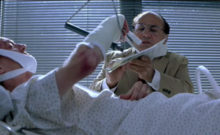After every jury trial, jurors almost always ask the attorneys about insurance. The jury heard the evidence. It made its decision based on that evidence. Insurance was not part of that evidence. But still, the jury wished it could know about insurance.
The reasons for this are obvious, because insurance underlies almost everything we do in a personal injury trial. Jurors are not told in court that defense counsel is hired by the auto insurance company or that the insurance company will be paying the verdict. They are not told that the insurance company maintains ultimate control over whether the case settles before trial. In fact, the “I-word” was never even uttered in the courtroom, besides when the judge instructed the jury not to even consider insurance in deciding the case.
Nevada law, as a general rule, does not allow anyone at the trial to discuss insurance: “Evidence that a person was or was not insured against liability is not admissible upon the issue whether the person acted negligently or otherwise wrongfully.” NRS 48.135(1). This law exists to ensure that defendants are treated equally in the courtroom whether or not they have insurance.
There is a sound purpose behind the law, but juries are often confused by it. It’s natural for juries to want to know whether the defendant’s insurance has already paid the plaintiff’s medical bills, whether the defendant will have to pay a judgment out of their own pocket, or whether the plaintiff’s medical bills have already been paid by the plaintiff’s own health insurance. These are legitimate concerns!
Juries don’t know that (1) if a case is in trial, it’s because no money has been paid to the plaintiff for their bodily injury; (2) the judgment will be paid by the defendant’s auto insurance company; and (3) even if a plaintiff’s health insurance has paid for their medical bills, the plaintiff is going to have to pay back their health insurance company from the judgment!
Trust the system!! What the law asks of the jury is to trust the system and render its verdict based on the evidence. As an attorney, I wish I could openly acknowledge jurors’ concerns about insurance and reassure them that the system accounts for all of them.




